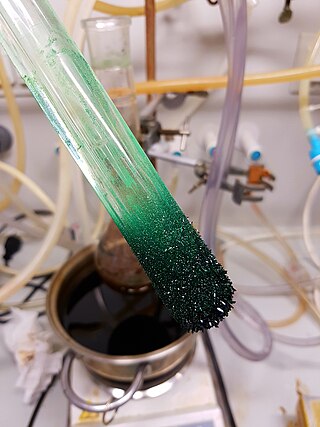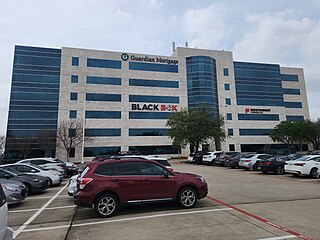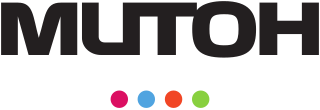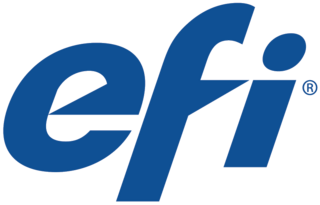
Screen printing is a printing technique where a mesh is used to transfer ink onto a substrate, except in areas made impermeable to the ink by a blocking stencil. A blade or squeegee is moved across the screen to fill the open mesh apertures with ink, and a reverse stroke then causes the screen to touch the substrate momentarily along a line of contact. This causes the ink to wet the substrate and be pulled out of the mesh apertures as the screen springs back after the blade has passed. One colour is printed at a time, so several screens can be used to produce a multi-coloured image or design.

A T-shirt is a style of fabric shirt named after the T shape of its body and sleeves. Traditionally, it has short sleeves and a round neckline, known as a crew neck, which lacks a collar. T-shirts are generally made of stretchy, light, and inexpensive fabric and are easy to clean. The T-shirt evolved from undergarments used in the 19th century and, in the mid-20th century, transitioned from undergarments to general-use casual clothing.

Sublimation is the transition of a substance directly from the solid to the gas state, without passing through the liquid state. The verb form of sublimation is sublime, or less preferably, sublimate. Sublimate also refers to the product obtained by sublimation. The point at which sublimation occurs rapidly is called critical sublimation point, or simply sublimation point. Notable examples include sublimation of dry ice at room temperature and atmospheric pressure, and that of solid iodine with heating.
The Textile Institute is a professional body for those engaged in clothing, footwear, and textile's whose headquarters are at 8th Floor St James's Buildings, 79 Oxford Street, Manchester, M1 6FQ, UK. The institute was founded in 1910 and incorporated in England by a Royal Charter granted in 1925 and is a registered charity. The Textile Institute works to promote professionalism in textiles and its related industries worldwide.

HP Indigo Division is a division of HP Inc.'s Graphic Solutions Business. It was founded in 1977 in Israel and acquired by Hewlett-Packard in 2001. HP Indigo develops, manufactures and markets digital printing solutions, including printing presses, proprietary consumables/supplies and workflow solutions. HP Indigo has offices around the world, with headquarters in Ness Ziona, Israel.
Heinz Joseph Gerber was an American inventor and businessman. An Austrian-born Jewish Holocaust survivor who immigrated in 1940, he pioneered computer-automated manufacturing systems for an array of industries. Described as the "Thomas Edison of manufacturing", he was one of the first to recognize and develop the productivity-enhancing potential for computer automation in skill-intensive industrial sectors.

Black Box is an IT company headquartered in Texas, United States. The company provides technology assistance and consulting services to businesses in a variety of sectors including retail, transportation, government, education, and public safety. Black Box operates in 75 locations across 35 countries. In 2022, Black Box had more than 3,800 employees worldwide.

Sustainable fashion is a term describing efforts within the fashion industry to reduce its environmental impacts, protect workers producing garments, and uphold animal welfare. Sustainability in fashion encompasses a wide range of factors, including cutting CO2 emissions, addressing overproduction, reducing pollution and waste, supporting biodiversity, and ensuring that garment workers are paid a fair wage and have safe working conditions.

Global Sources Magazines are a series of trade magazines designed for businesses importing from China and Asia. There are 19 specialized industry-specific titles published by the business-to-business media company Global Sources. All except two titles are published monthly.

QuantumDigital, Inc., is a company based in Austin, Texas. It was founded in 1986 as Quantum Systems. QuantumDigital was one of the first companies in the U.S. to launch an electronic ordering system, called Q-Direct, for the direct mail industry. The Q-Direct client software was distributed on physical CD-ROM media. Orders were placed via modem connection from the customer's computer to the company's server.

Mutoh Europe nv is a business unit of Mutoh Holdings Co. Ltd.
Digital textile printing is described as any ink jet based method of printing colorants onto fabric. Most notably, digital textile printing is referred to when identifying either printing smaller designs onto garments and printing larger designs onto large format rolls of textile. The latter is a growing trend in visual communication, where advertisement and corporate branding is printed onto polyester media. Examples are: flags, banners, signs, retail graphics.

Electronics for Imaging, Inc. (EFI) is an international company based in Silicon Valley that specializes in digital printing technology. Formerly located in Foster City, California, the company is now based in Fremont. On July 1, 2015, EFI entered the textile printing marketing with the acquisition of Italian digital textile company Reggiani Macchine. On June 16, 2016, EFI acquired Optitex, a 3D digital workflow provider.
Crest Digital was a privately owned company specializing in post production and DVD/CD replication. Crest Digital provided editing, DVD and Blu-ray authoring, digital asset management, audio mixing, language dubbing and subtitling, and DVD/CD optical media replication services. Clients included major film and television studios, software companies, record labels, airlines and industrial clients from around the world. The company closed in September 2012.
Otara Gunewardene is a Sri Lankan entrepreneur, animal welfare advocate, conservationist and philanthropist. She is the founder of ODEL, Embark and Otara Foundation.
Promotional apparel is clothing imprinted with a company's name, logo or message. They include shirts, gloves, hats, jackets and any piece of clothing that can be incorporated in marketing and communication campaigns. Promotional clothing is used to endorse a product, service or company agenda. The importance of promotional apparel lies in the relationship that is generated between businesses and the public. Businesses require promotional items to help reach potential customers and clients. With promotional apparel, businesses are able to obtain exposure and brand recognition. Promotional apparel is usually distributed as handouts or shipped as bonus items to accompany a purchase.
Lucas is an English company that offers specialised contracting services in the fields of coating, fit-out and finishing to the construction industry. The company is headquartered in Wrotham, Kent.
Kornit Digital Ltd. is an Israeli-American international manufacturing company. It produces high-speed industrial inkjet printers, pigmented ink and chemical products for the garment and apparel, home goods, textile accessories and decorating industry.
Southern Tide is an American apparel company founded in 2006 in Greenville, South Carolina, by Allen Stephenson. The brand is owned by Atlanta-based Oxford Industries.
Mimeo.com, Inc. is a privately held Print on demand and digital distribution document company. It was the first to offer online printing and overnight delivery of complex documents and marketing materials. The company refers to itself as a technology company that prints. Customers utilize a proprietary online workflow connected to multiple print production, warehouse and distribution centers. Customers include small, mid-sized and large companies. The company was named after the Mimeograph. Printing and distribution centers are located in Memphis, Tennessee, Berlin, Germany and Huntingdon, Cambridgeshire, England.








